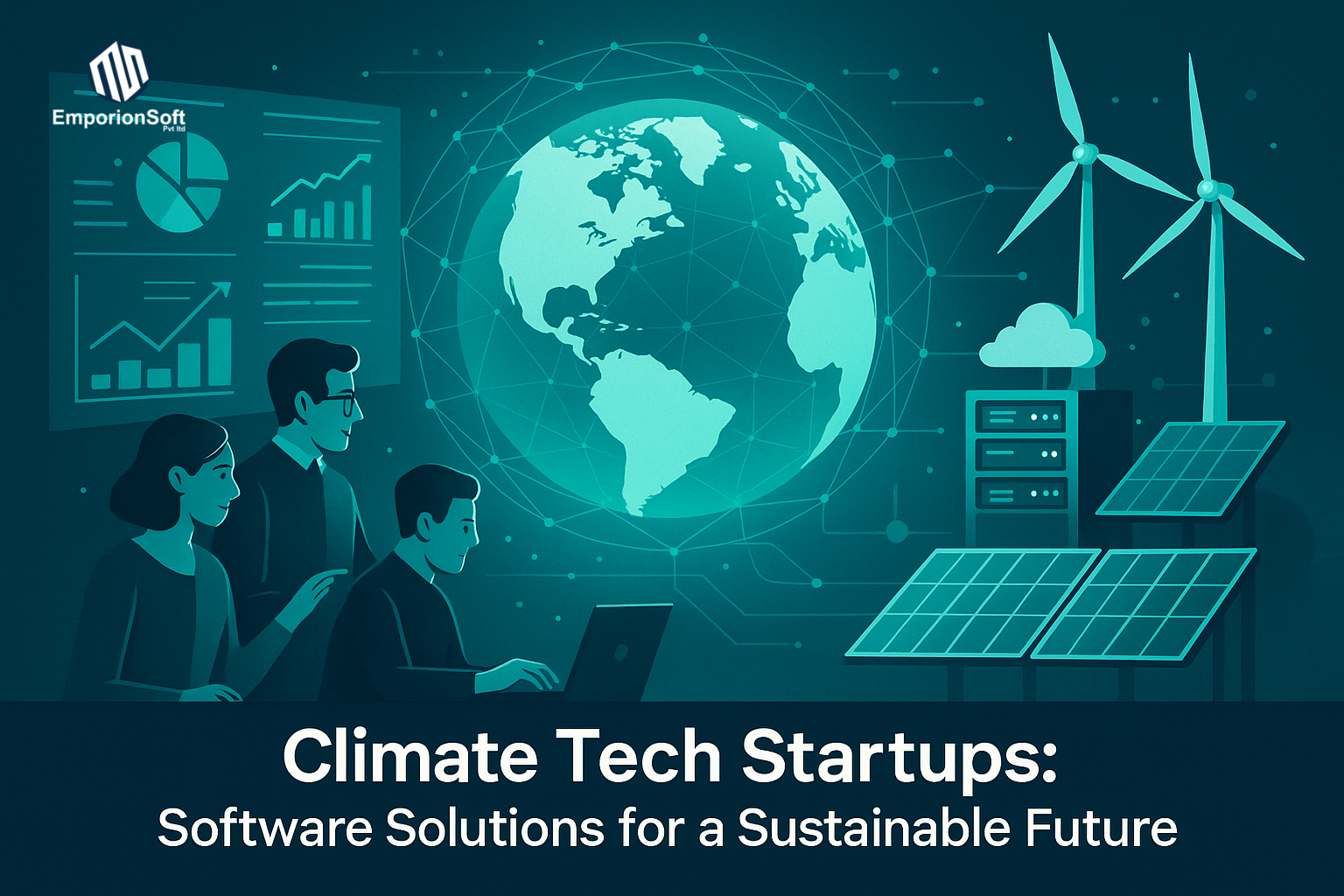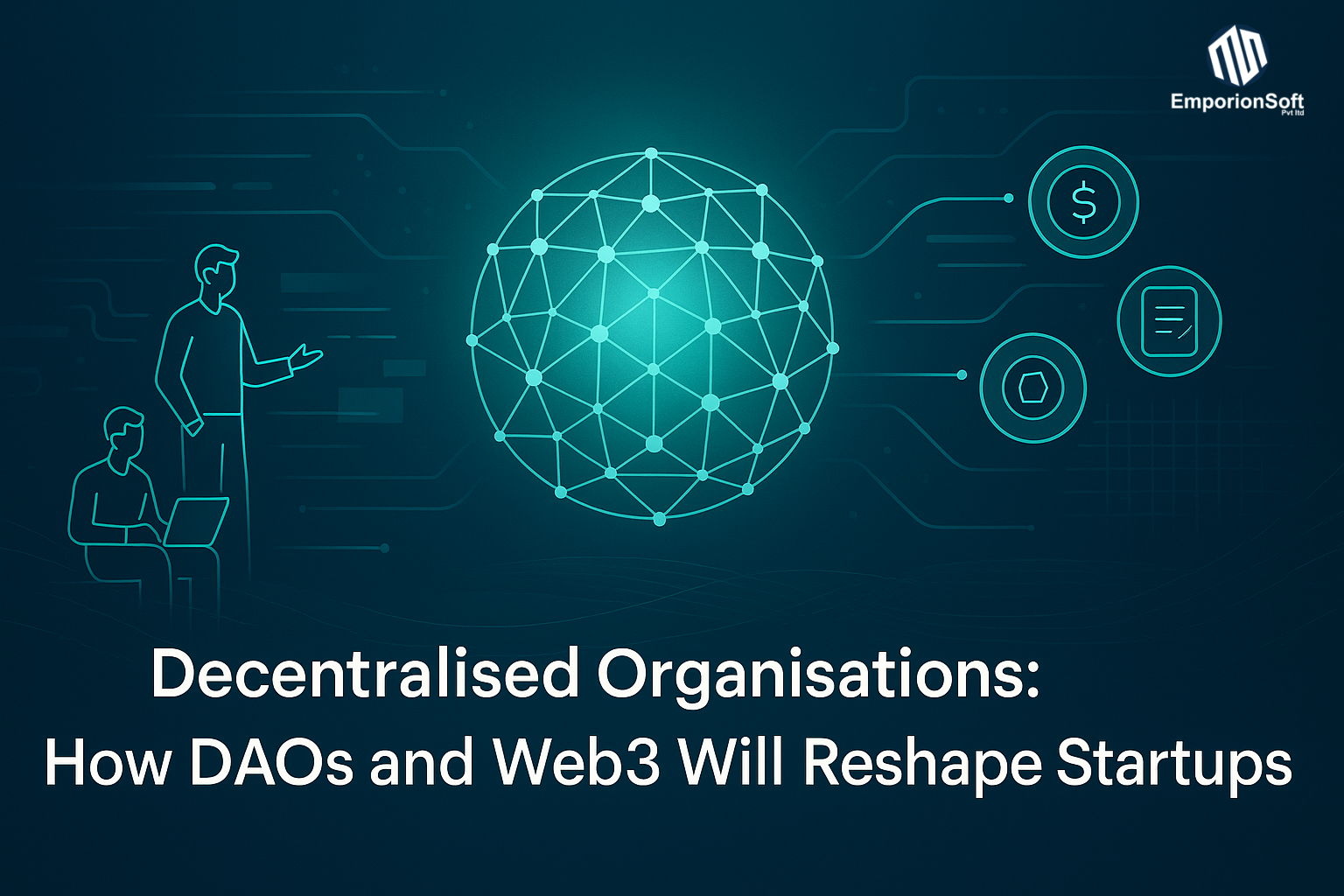The Rise of Climate Tech Startups in the UK
In an era where the consequences of climate change are no longer distant forecasts but present realities, the global startup ecosystem is responding with unprecedented innovation. From carbon accounting platforms to AI-powered energy management systems, climate tech startups are shaping a new generation of sustainable businesses. Across the UK, this movement has gained powerful momentum — combining cutting-edge software solutions with a collective drive towards net-zero emissions and long-term environmental resilience.
Recent data from PwC’s State of Climate Tech 2024 report reveals that global investment in climate technology surpassed $70 billion, with the UK securing a growing share of this capital. This surge highlights how the nation’s green technology startups are emerging as key players in tackling carbon-intensive industries and redefining sustainability through digital transformation.
Why Climate Tech Matters
The urgency to combat climate change has never been greater. Global temperatures are rising faster than expected, and industries face increasing pressure to decarbonise. This is where climate tech startups UK are stepping in — developing software platforms that help businesses monitor, measure, and reduce their environmental impact.
These startups are no longer niche players; they represent the front line of climate innovation. From carbon tracking software that enables companies to quantify their emissions, to energy optimisation platforms powered by machine learning, software now sits at the core of every climate tech solution.
Moreover, sustainable tech startups UK are not just creating tools; they are building ecosystems. Cloud-based systems integrate IoT sensors, AI models, and big data analytics to streamline environmental reporting and ESG compliance. This convergence of software and sustainability is accelerating the UK’s path to a low-carbon economy — aligning perfectly with national and international climate objectives.
The UK’s Net-Zero Vision
The UK climate tech ecosystem stands among the most dynamic in the world. Bolstered by government initiatives such as the Net Zero Innovation Portfolio and Clean Growth Strategy, the nation is investing heavily in technologies that reduce emissions across transport, energy, and construction sectors. According to GOV.UK, the UK aims to cut greenhouse gas emissions by 68% by 2030, making innovation-led entrepreneurship essential to achieving this goal.
Cities like London, Manchester, and Oxford have evolved into hotbeds for net zero startups UK, hosting accelerators, incubators, and research partnerships dedicated to clean growth. Companies like Octopus Energy, Carbon Clean, and Oxwash exemplify how British startups are leveraging software engineering to scale sustainable solutions that have global impact.
As the climate emergency intensifies, the fusion of environmental science and digital innovation is proving indispensable. And at the forefront of this movement are green technology startups UK, whose digital ingenuity is shaping the roadmap for a sustainable and profitable future.
At EmporionSoft, we recognise the transformative role of software in building a greener world. Our team helps startups and enterprises alike develop scalable digital products that support sustainability goals and operational efficiency. Explore more insights on how emerging technologies are shaping global innovation on our Insights page.
Authoritative Source: GOV.UK – Net Zero Strategy
Software-Driven Climate Innovation
In the rapidly evolving landscape of climate tech startups, software has become the driving force behind measurable, scalable climate solutions. The integration of artificial intelligence, cloud computing, and data analytics is accelerating climate innovation in the UK, enabling both startups and enterprises to track emissions, optimise renewable systems, and forecast environmental outcomes with remarkable precision.
As industries strive to decarbonise and governments tighten sustainability regulations, green innovation companies UK are responding by deploying powerful digital tools that turn complex environmental data into actionable insights. This software-led transformation is not just supporting policy compliance — it’s redefining how sustainability is engineered, measured, and scaled.
Carbon Management Platforms & AI Optimisation
At the heart of clean growth innovation UK lies the rise of intelligent carbon management platforms — advanced software systems that quantify, analyse, and report on corporate carbon footprints in real time. Using machine learning and cloud-based data pipelines, these tools help organisations automate the tracking of Scope 1, 2, and 3 emissions, ensuring transparency across the supply chain.
AI-driven optimisation systems are particularly transformative for renewable energy startups UK. By leveraging predictive analytics, artificial intelligence can anticipate fluctuations in solar, wind, or hydro energy output and adjust distribution to reduce waste. For instance, AI-based grid management systems are helping cities dynamically balance renewable inputs, minimising reliance on fossil fuels while stabilising energy delivery.
Companies such as EmporionSoft are leading this shift by developing custom digital tools that empower sustainable business transformation — from automated ESG dashboards to carbon accounting applications that integrate directly with enterprise systems. These solutions not only enhance compliance but also support smarter, data-backed decision-making for climate-conscious organisations.
Learn more about how EmporionSoft builds bespoke climate software through their Services page.
External research supports this growing trend: According to a 2025 analysis by Tech Nation and PwC, over 60% of UK climate startups now incorporate AI or data science components into their sustainability solutions. This technological sophistication is what differentiates today’s climate tech sector from its predecessors — precision, automation, and scalability.
Predictive Tools for Net-Zero Roadmaps
Beyond immediate emission tracking, predictive analytics has become indispensable in shaping net-zero strategies. Modern data-driven systems use historical patterns, environmental modelling, and sensor data to simulate carbon reduction outcomes before they are implemented. This approach allows organisations to test the impact of policy, technology, and operational changes virtually — dramatically reducing risk and improving cost-efficiency.
For example, software-led scenario modelling helps renewable energy startups UK determine optimal infrastructure placement for solar arrays or wind farms by combining geographic data, weather forecasting, and machine learning predictions. Similarly, urban planners are using AI simulations to identify the most effective pathways to achieve localised net-zero goals, from energy-efficient buildings to electrified transport networks.
These predictive tools are not isolated innovations but part of a broader clean growth ecosystem — one where data platforms, APIs, and interoperable software layers collaborate to create real-time environmental intelligence.
For startups and businesses seeking strategic technology partners in this domain, agencies like TheCodeV demonstrate how integrated digital partnerships can turn visionary sustainability ideas into practical, software-powered solutions that scale globally.
By combining software engineering excellence with sustainability intelligence, climate tech startups are proving that digital innovation is not merely an enabler — it is the cornerstone of the UK’s transition toward a cleaner, smarter, and more resilient future.
The UK Cleantech Ecosystem: Startups Leading the Charge
The United Kingdom has emerged as one of the most dynamic ecosystems for cleantech startups UK, blending policy support, venture capital, and world-class talent to fuel sustainable innovation. With a strong national commitment to achieving net-zero emissions by 2050, the country has become a thriving hub for climate tech startups London, Manchester, and Oxford — cities that are now synonymous with clean growth and green entrepreneurship.
These UK cleantech clusters are home to hundreds of pioneering companies redefining how energy, waste, transport, and manufacturing systems operate. What sets the UK apart is its ability to connect cutting-edge software innovation with real-world sustainability challenges — from carbon capture and renewable integration to recycling and supply chain transparency.
Government-Backed Clusters and Innovation Hubs
The UK government has actively supported the rise of green startup hub UK initiatives through organisations like Innovate UK, Tech Nation, and the Department for Energy Security and Net Zero. These programmes channel millions of pounds into research, pilot projects, and startup acceleration to ensure that innovation thrives across every region.
In London, several high-impact accelerators, such as the Carbon13 Climate Venture Builder and Tech Nation’s Net Zero Programme, are nurturing early-stage ventures focused on sustainability-driven technologies. Meanwhile, Manchester — through its Greater Manchester Combined Authority’s Green Growth programme — is becoming a regional centre for smart energy and low-carbon mobility innovation.
Further south, Oxford’s Science and Innovation Campus continues to play a pivotal role in supporting climate innovators, offering incubation support to deep-tech ventures tackling emissions and resource management challenges. These climate tech venture hub UK initiatives collectively contribute to a vibrant ecosystem that connects entrepreneurs, investors, and researchers for collaborative growth.
For a deeper understanding of how innovation ecosystems can withstand disruption while remaining sustainable, see EmporionSoft’s insight on Building Resilient Software: Strategies for Disaster Recovery and Business Continuity.
Top UK Climate Tech Success Stories
The UK’s climate tech movement is defined by its success stories — startups that began with bold ideas and are now global leaders in sustainability technology.
1. Octopus Energy (London)
Perhaps the most recognisable name among climate tech startups London, Octopus Energy is revolutionising the renewable energy market with its AI-powered Kraken platform. This system enables real-time optimisation of energy supply and demand, integrating millions of data points to manage green energy distribution efficiently. The company’s valuation surpassed £4 billion, proving that cleantech can be both profitable and transformative.
2. Carbon Clean (London & India)
Another standout, Carbon Clean, focuses on carbon capture technology for industrial facilities. Its modular systems reduce emissions from cement and steel plants, with global clients in over 40 countries. Recognised by Tech Nation and the Financial Times, Carbon Clean has become a benchmark for UK cleantech clusters scaling internationally.
3. Oxwash (Oxford)
From Oxford’s innovation ecosystem, Oxwash exemplifies circular economy principles through its software-integrated laundry logistics platform. By using electric cargo bikes and advanced water recycling, Oxwash delivers carbon-neutral services to major clients, including hotels and universities. It demonstrates how even traditional industries can be transformed by digital-first, eco-friendly operations.
Beyond these pioneers, hundreds of cleantech startups UK are pushing boundaries in areas like smart grids, sustainable construction, and waste-to-energy innovation — many of which are supported by incubators such as GreenTech South, Energy Systems Catapult, and Cambridge Cleantech.
The Collaborative Power of Cleantech Clusters
The success of the UK cleantech ecosystem lies not only in individual breakthroughs but in the collaborative networks that unite academia, enterprise, and government. These clusters foster shared learning, access to green financing, and the cross-pollination of ideas across disciplines.
By bridging the gap between research and commercial deployment, the UK is transforming sustainability into a data-driven, software-powered sector that attracts investors worldwide.
To see how digital innovation underpins climate resilience and clean growth, explore EmporionSoft’s Case Studies showcasing scalable software solutions built for environmental and business sustainability.
Authoritative Source: Innovate UK – Clean Growth and Infrastructure
Emerging Climate Tech Software Trends
The next wave of sustainable innovation is being shaped by intelligent, data-driven systems that are redefining what’s possible in climate technology. Across the UK, sustainable tech startups UK are merging environmental science with advanced software engineering to accelerate the global transition to net-zero. From connected sensors to predictive AI models and blockchain-based traceability tools, the landscape of clean growth innovation UK is evolving faster than ever.
As industries demand greater transparency, efficiency, and accountability, emerging climate tech companies UK are seizing the opportunity to build platforms that not only measure sustainability impact but actively optimise it. These innovations are positioning the UK as a leader in digital sustainability — where software becomes the engine of green transformation.
AI for Environmental Efficiency
Artificial intelligence has become one of the most powerful enablers for green innovation companies UK. AI algorithms can process vast environmental datasets to reveal insights that were once impossible to identify. From optimising renewable energy grids to predicting air quality fluctuations, machine learning is empowering businesses to act with precision and foresight.
For example, predictive AI models are being used to fine-tune wind turbine operations, improving energy yield and reducing mechanical stress. Meanwhile, data-driven forecasting tools help cities optimise heating, cooling, and traffic systems to cut emissions in real time.
Many sustainable tech startups UK are building custom AI-driven sustainability dashboards that track performance against ESG and carbon reduction goals — allowing companies to make decisions rooted in evidence, not estimation. These tools bridge the gap between environmental ambition and measurable results.
For organisations exploring intelligent automation, AI in Software Development by EmporionSoft provides insights into how machine learning architectures are reshaping industries far beyond traditional tech.
IoT for Energy Optimisation
The Internet of Things (IoT) is playing an equally vital role in enabling clean growth innovation UK. Through a network of smart sensors and connected devices, IoT solutions collect granular data on energy use, waste management, and environmental performance.
Industrial facilities, for instance, deploy IoT-based monitoring systems to detect inefficiencies in energy consumption, helping reduce both operational costs and carbon footprints. In residential and urban contexts, IoT platforms integrate with smart grids to manage electricity flow dynamically, ensuring renewable energy sources are used to their fullest potential.
By merging IoT data streams with AI analytics, emerging climate tech companies UK are developing integrated sustainability ecosystems — capable of self-correcting inefficiencies and predicting energy demands before they occur. The result is a smarter, more adaptive infrastructure supporting the UK’s journey to net zero.
Blockchain for Green Transparency
Transparency is at the core of sustainable progress — and blockchain technology is redefining how trust and accountability are maintained across global supply chains. For green innovation companies UK, distributed ledger systems offer a secure, tamper-proof method to track every stage of a product’s lifecycle, from raw material extraction to final delivery.
This approach is particularly impactful for sectors like manufacturing, food production, and renewable energy, where stakeholders require proof of sustainable sourcing and ethical operations. Blockchain’s immutability ensures that sustainability claims are verifiable — reducing “greenwashing” and strengthening consumer trust.
Additionally, blockchain-powered carbon credit systems are emerging as scalable solutions for emission tracking and trading. These digital ledgers allow businesses to offset emissions transparently while ensuring regulatory compliance.
EmporionSoft explores this transformative technology in Blockchain Beyond Crypto, illustrating how decentralised systems are revolutionising more than finance — they’re redefining environmental accountability.
Building Scalable Climate Tech Software Platforms
As the climate technology sector matures, scalability has become a defining factor separating promising prototypes from globally impactful solutions. Today’s climate tech startups UK are not just developing environmental software—they’re engineering cloud-native platforms capable of processing vast datasets, deploying AI-driven insights, and integrating seamlessly with IoT and ESG systems.
To achieve this, startups are adopting modern development methodologies and architectures rooted in agility, cloud computing, and data intelligence. From data lakes to LLMOps, these software practices are empowering low carbon startups UK to innovate rapidly while maintaining flexibility, reliability, and sustainability at scale.
Scaling with Data-Driven Infrastructure
At the heart of every scalable climate solution lies data—from satellite imagery and weather forecasts to emissions tracking and predictive energy analytics. To handle this complexity, sustainable entrepreneurship UK increasingly depends on data lake architectures, which store and organise massive volumes of structured and unstructured information from diverse sources.
Unlike traditional databases, data lakes enable near real-time analytics, supporting predictive models for carbon reduction, energy demand forecasting, and climate risk assessment. They also serve as the foundation for advanced AI and machine learning models that drive intelligent decision-making within climate intelligence systems.
For example, a renewable energy platform might use a data lake to aggregate IoT sensor data from solar panels and wind turbines, allowing AI algorithms to predict optimal production schedules. This level of insight is essential for both scalability and measurable environmental impact.
EmporionSoft’s insight, Harnessing the Power of Data Lakes for Scalable Data-Driven Software Development, explores how data lake ecosystems empower climate startups to build smarter, faster, and greener.
By leveraging the elasticity of cloud infrastructure (AWS, Azure, Google Cloud), startups can dynamically scale their operations to meet global sustainability demands without heavy upfront costs or carbon-intensive hardware.
Software Architecture for Sustainability
Scalable climate tech platforms require software architectures designed around resilience, modularity, and continuous delivery. Agile development methodologies allow teams to adapt quickly to evolving environmental data, regulation updates, and market dynamics. This iterative approach ensures that sustainability solutions remain relevant and responsive to real-world needs.
Cloud-native frameworks such as Kubernetes, Docker, and microservices architecture are redefining how climate tech startups UK build and deploy their systems. These tools enable distributed computing, fault tolerance, and flexible scaling—critical capabilities for startups managing volatile energy data and global sustainability metrics.
Moreover, LLMOps (Large Language Model Operations) is now being integrated into climate software pipelines to automate analysis and decision support. LLMOps allows startups to train and deploy AI models that interpret sustainability reports, generate compliance summaries, and even recommend data-driven emission strategies.
EmporionSoft explores this innovation in LLMOps: Scaling, Monitoring, and Optimising Large Language Models in Real-World Apps, showcasing how operationalising AI enhances environmental intelligence systems.
By combining agile practices, modular architectures, and AI-driven automation, climate tech startup accelerator UK programmes are enabling founders to bring scalable, low-carbon digital products to market faster than ever.
The Future of Scalable Green Platforms
The convergence of cloud infrastructure, AI, and sustainability analytics has made scalability synonymous with impact. Low carbon startups UK that prioritise flexible, data-centric architectures can evolve quickly, adapt globally, and deliver measurable contributions to decarbonisation goals.
In this new era of sustainable entrepreneurship UK, scalability is more than a technical capability—it’s a sustainability strategy in itself, allowing startups to amplify positive change through intelligent, software-driven ecosystems.
Challenges in Building a Green Startup
While the UK has become a global leader in climate innovation, the road to success for green technology startups UK is far from straightforward. Founders in this fast-evolving sector face a complex mix of policy, funding, and technical challenges — each shaping how sustainable innovation takes root and scales. Yet, amid these constraints, the UK’s position as a thriving green startup hub UK offers immense opportunity for those who can adapt, innovate, and leverage software-driven efficiency to overcome systemic barriers.
As net zero startups UK pursue climate-positive transformation, their ability to navigate regulation, secure funding, and design resilient software architectures will determine their long-term sustainability — both environmentally and commercially.
Regulatory, Technical, and Funding Barriers
For many early-stage ventures, navigating the regulatory environment is one of the most significant hurdles. The UK government’s evolving sustainability frameworks — including the Net Zero Strategy and Clean Growth Plan — introduce compliance complexities around data reporting, carbon accounting, and ESG transparency. While these policies are designed to encourage cleaner practices, they can create administrative overhead for startups lacking resources or technical infrastructure.
Funding remains another substantial obstacle. Despite record-breaking investment in climate innovation, a PwC Net Zero Future50 report notes that over 70% of green startups still struggle to secure consistent early-stage capital. Investors often require proof of scalability and revenue models, which can be difficult for companies developing research-intensive or regulatory-dependent technologies.
On the technical side, software scalability and interoperability pose growing challenges. Many climate solutions rely on integrating multiple systems — from IoT sensors and data lakes to carbon analytics and energy management platforms. Without agile architecture, these integrations can become costly, fragmented, and inefficient.
To mitigate these issues, startups are increasingly turning to adaptive and modular development frameworks. EmporionSoft discusses this in detail in Adaptive Software Development, explaining how flexibility and iteration can help climate-focused ventures evolve alongside policy and market shifts.
Unlocking Opportunities with Scalable Software
Despite these challenges, the opportunities for sustainable business incubators UK and entrepreneurs in the green tech space are growing rapidly. Government-backed programmes such as Innovate UK’s Net Zero Innovation Portfolio and London’s Green Finance Institute are providing financial and technical support for scaling sustainable solutions.
At the same time, software innovation continues to unlock new efficiencies. Cloud-native systems, AI analytics, and digital twins allow startups to model, test, and optimise environmental outcomes before deployment. These tools reduce the cost of experimentation and improve scalability, giving smaller companies a competitive edge in a data-driven economy.
Furthermore, the collaborative environment of the green startup hub UK — connecting universities, corporate partners, and tech consultancies — fosters cross-sector partnerships essential for growth. Organisations like Tech Nation and Cambridge Cleantech are building ecosystems where climate innovation thrives through shared data, open APIs, and co-development models.
For climate entrepreneurs seeking expert guidance on software design, innovation strategy, or digital sustainability transformation, EmporionSoft offers tailored Consultation services designed to help startups align their technology with both business and environmental goals.
The lesson is clear: while barriers exist, they are not insurmountable. With strategic partnerships, adaptable architectures, and a commitment to continuous improvement, net zero startups UK can transform today’s obstacles into tomorrow’s competitive advantages.
Investment and Policy Landscape Powering UK Climate Innovation
The United Kingdom’s transformation into a global climate tech venture hub UK has been driven by a powerful combination of private capital, progressive policy, and corporate sustainability initiatives. As global investors prioritise environmental, social, and governance (ESG) alignment, the UK has emerged as a frontrunner in attracting funding for clean growth innovation UK and climate-positive technology.
In 2024 alone, Climate Tech VC reported that over £6.5 billion was invested in UK-based cleantech and sustainability startups — a 28% increase from the previous year. This surge reflects the growing confidence of venture capitalists and policymakers in the potential of green innovation companies UK to generate both environmental and economic returns.
Venture Capital and Private Investment Momentum
Private capital has played a crucial role in accelerating climate innovation. Funds such as Energy Impact Partners, Octopus Ventures, and Clean Growth Fund have become major backers of UK cleantech clusters, investing in technologies ranging from carbon capture and energy storage to AI-based resource optimisation.
These funds are increasingly focusing on software-first climate startups — companies that build digital tools for carbon management, energy forecasting, and ESG analytics. Investors recognise that software-driven solutions can scale globally with minimal environmental footprint, amplifying climate impact per investment pound.
The concentration of climate venture capital around London, Cambridge, and Oxford has also reinforced the UK’s leadership in green entrepreneurship. These regions now host some of Europe’s most active startup accelerators and research partnerships, including Carbon13, Tech Nation’s Net Zero Programme, and Green Angel Syndicate.
EmporionSoft’s insight on Project Management Tools for Tech Companies highlights how structured planning and agile execution are critical in managing such large-scale innovation projects — especially those involving complex, multi-stakeholder climate technologies.
Government Incentives and Policy Support
The UK government has created a robust policy framework that nurtures clean growth innovation UK through both financial incentives and regulatory clarity. Key programmes such as the Net Zero Innovation Portfolio, Clean Growth Fund, and Industrial Energy Transformation Fund have collectively allocated billions to climate technology research, commercialisation, and deployment.
Tax relief initiatives like the Enterprise Investment Scheme (EIS) and R&D Tax Credits have further encouraged private investors and startups to engage in sustainable innovation. Meanwhile, policies under the UK Net Zero Strategy ensure that innovation funding aligns with long-term emission reduction goals.
These coordinated efforts have positioned the UK not only as an early adopter but as a policy-driven incubator for green technologies. They also create a stable environment for green innovation companies UK to scale their digital platforms and infrastructure without excessive policy risk.
Corporate Sustainability Investments
Alongside startups and VCs, large enterprises are increasingly contributing to the UK cleantech clusters through direct investment and strategic partnerships. Major corporations — from BP Ventures to National Grid — are funding early-stage pilots that blend software, renewable energy, and data science to meet corporate sustainability targets.
This cross-sector collaboration has led to a surge in demand for enterprise-grade software solutions that facilitate carbon auditing, energy optimisation, and supply chain transparency. Many of these projects rely on cloud infrastructure and big data analytics — technologies central to sustainable scaling.
EmporionSoft’s resource on the Future of Cloud Computing illustrates how cloud-native platforms are accelerating innovation across cleantech industries, offering scalable performance with reduced energy consumption.
The Financial Future of Climate Innovation
As the UK cements its reputation as Europe’s premier climate tech venture hub, financial institutions and policymakers are working hand-in-hand to sustain momentum. Initiatives from London & Partners and the UK Infrastructure Bank are bridging capital gaps by connecting impact investors with promising green innovation companies UK.
This synergy between public policy and private finance ensures that sustainability is no longer treated as a moral imperative alone — but as a viable, high-return investment class. The combination of strategic funding, supportive governance, and a thriving innovation culture continues to propel clean growth innovation UK, setting the standard for how digital transformation can enable a truly sustainable economy.
The Future of Climate Tech Software
The rise of climate tech startups marks a defining moment in how technology is being used to tackle the planet’s most urgent challenge. Across the globe—and particularly within the United Kingdom—innovation in software, artificial intelligence, and cloud computing is accelerating the world’s shift toward net zero. These digital breakthroughs are helping organisations monitor emissions, predict environmental impact, and optimise renewable systems with unprecedented accuracy.
Through a combination of AI-driven analytics, scalable cloud infrastructure, and data intelligence, the UK has positioned itself at the forefront of climate innovation UK. The country’s strong research base, forward-thinking policies, and growing community of renewable energy startups UK have collectively built a foundation for a greener, more resilient digital economy.
From smart grid optimisation to carbon tracking platforms and ESG dashboards, climate tech startups are redefining what sustainable business means in the 21st century. Software no longer merely supports operations — it drives measurable change. Every line of code, every algorithm, and every connected device contributes to a vision where innovation serves the environment rather than depletes it.
This shift represents more than just technological evolution; it is the emergence of sustainable entrepreneurship UK — a new paradigm in which businesses, investors, and developers unite to deliver profitability with purpose. By leveraging scalable, data-driven platforms, these innovators are transforming sustainability into both a moral responsibility and a competitive advantage.
As the International Energy Agency (IEA) notes, digital technologies will be central to achieving global decarbonisation, enabling smarter energy management and sustainable economic growth. Similarly, the UN Climate Reports emphasise the role of software and AI in accelerating sustainable transformation at scale. Together, these perspectives highlight how the digital revolution can align seamlessly with the environmental one.
Partnering for a Greener Digital World
At the heart of this transformation are technology partners who understand the intersection of innovation and sustainability. EmporionSoft Pvt Ltd stands at the forefront of this change — crafting intelligent, cloud-based software that empowers climate-focused organisations to scale their impact globally.
From building AI-driven carbon analytics platforms to designing sustainable digital infrastructures, our team combines expertise in modern software engineering with a commitment to climate responsibility. Whether you are an early-stage startup or an established green enterprise, EmporionSoft offers the technological foundation to help you achieve your environmental and business goals.
At EmporionSoft, we empower green innovators with intelligent, scalable software solutions that drive measurable sustainability impact. Ready to lead the change? Contact our team today or explore our Services to start building your next climate innovation.
With the UK leading the charge in climate innovation UK, the future of sustainability is being written in code — and the world is ready to follow.









